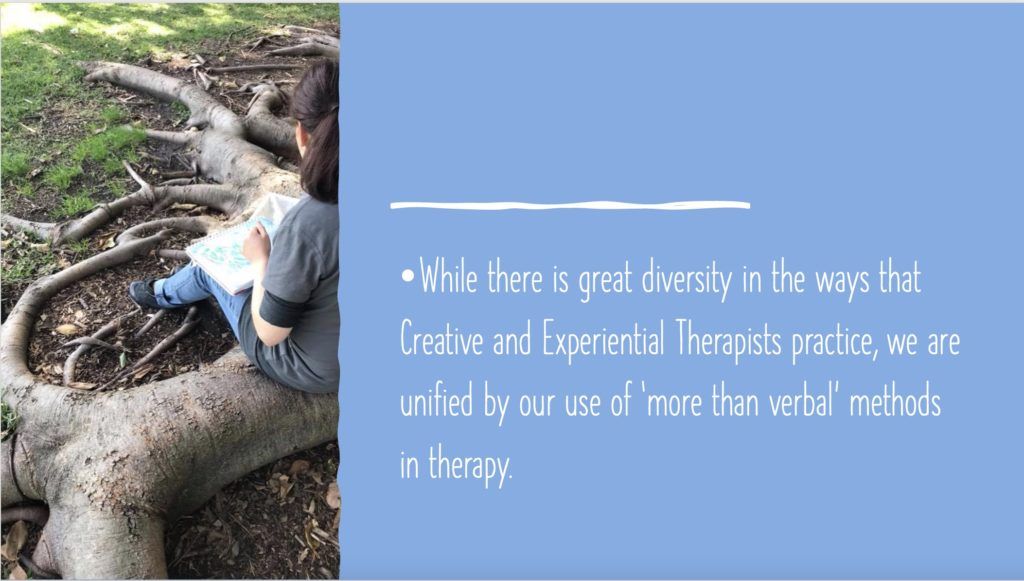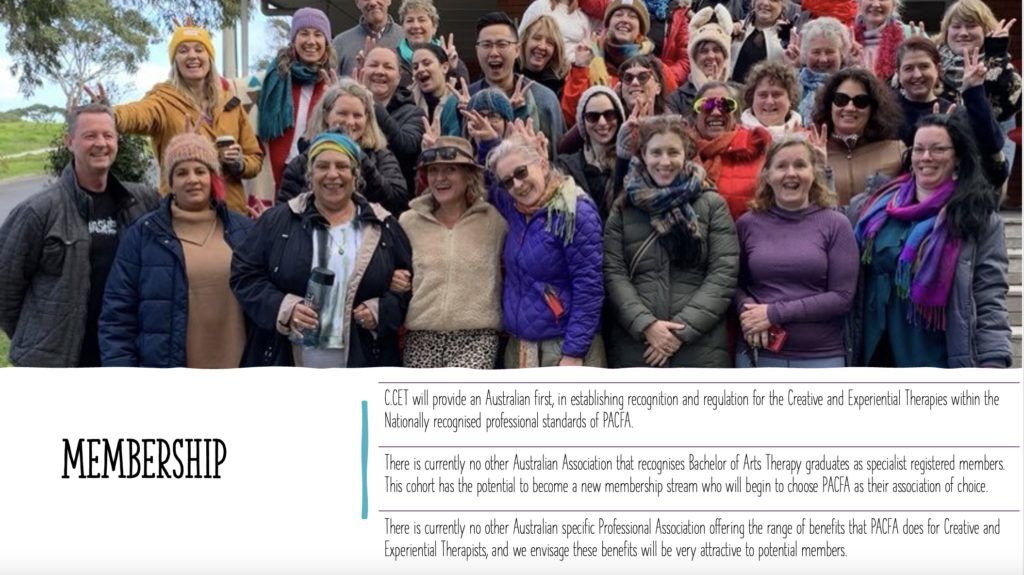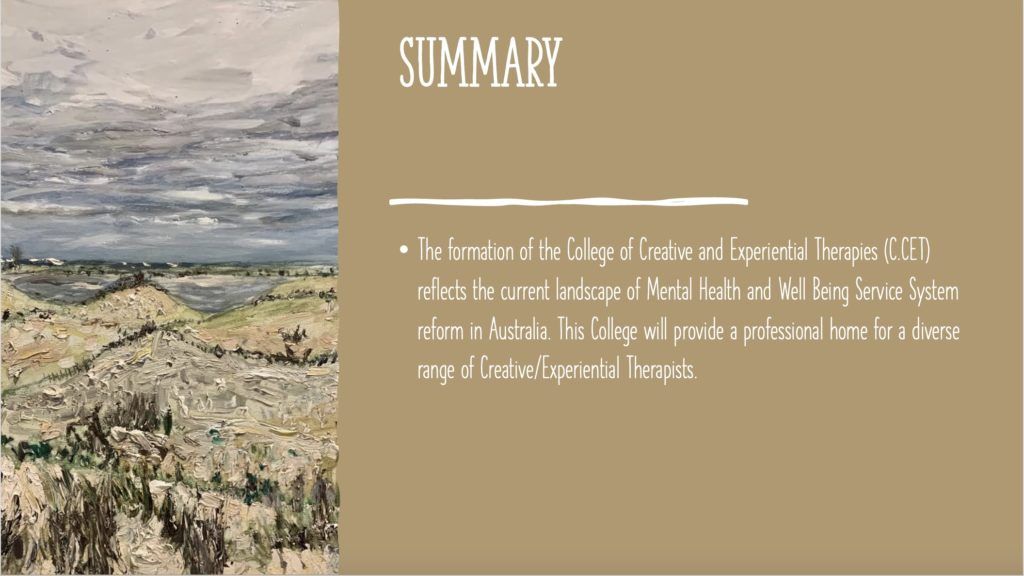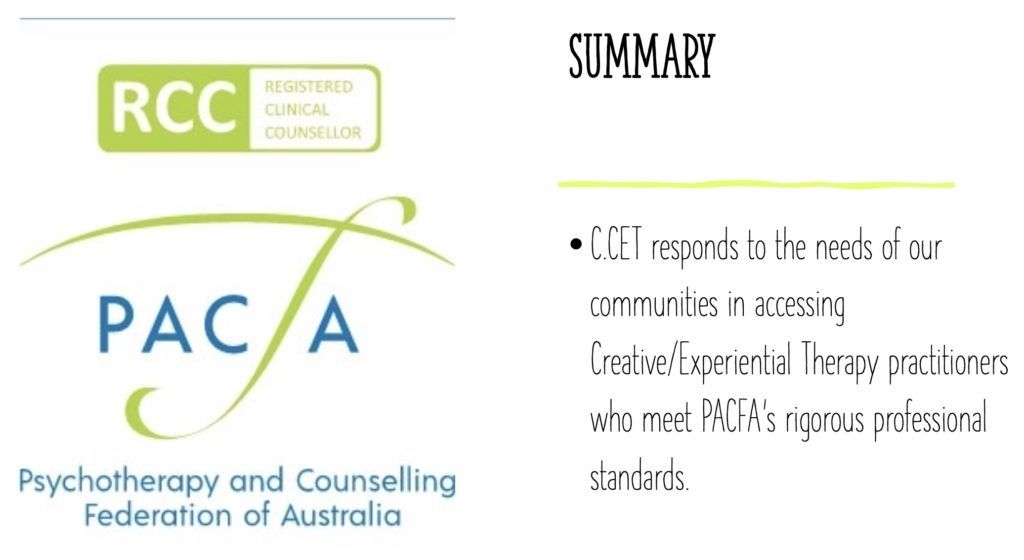In an Australian first, the Psychotherapy and Counselling Federation of Australia (PACFA) has voted unanimously to establish a new professional home for Creative and Experiential Therapists – the College of Creative and Experiential Therapies, or C.CET.
In this 14 minute video, C.CET Convenor, Creative Arts Therapist Dr Carla van Laar, provides a brief overview of the information contained in the proposal to establish a new College of Creative and Experiential Therapies within the Psychotherapy and Counselling Federation of Australia (PACFA).
Creative and Experiential Therapies
Creative and Experiential Therapists specialise in the use of ‘more than verbal’ approaches in therapy.
We engage creative practices and experiential processes in our therapeutic work with people. These creative and experiential approaches can include the arts, such as visual, music, dance/movement, creative writing and drama, as well as play, embodied/somatic, nature-based and animal-assisted methods.
While there is great diversity in the ways that Creative and Experiential Therapists practice, we are unified by our use of ‘more than verbal’ methods in therapy.

Rationale for C.CET
The World Health Organisation (WHO) has confirmed the effectiveness of the arts and creative therapies for helping people experiencing mental illness at all stages of the life course, and has reported studies suggesting good cost–effectiveness (2019).
An Australian review of the efficacy of the Creative Arts Therapies (2013) supported the effectiveness of creative therapies for a wide range of conditions.
Experiential therapies are gaining increasing recognition through advances in research into the neuroscience of trauma and the importance of experiential self-awareness/interoception and proprioception as core elements of therapy (see for e.g. Porges & Dana (2018), Van der Kolk (2014), Buckley, Punkanen & Ogden (2018), Payne, Levine & Crane-Godreau (2015).
Creative/Experiential Therapists work flexibly across a spectrum of responses to Mental Health and Wellbeing, including engagement for well-being, health promotion activities, prevention, treatment, acute care and recovery. One of the well-known strengths of Creative/Experiential Therapy is its capacity to connect with people in ways that go beyond words.
Through the establishment of this College, more work can be done to consolidate the evidence supporting this new and significant coalition of practice modalities.

Expert opinion concurs
Expert opinion concurs that Creative Therapies are effective and particularly appropriate in supporting mental health and well-being in schools.
Jill Gallagher AO, CEO of the Victorian Aboriginal Community Controlled Health Organisation, VACCHO, and former Treaty Advancement Commissioner,
“I would love to see our young people able to see an Arts Therapist in schools. Before 2020, of course, many of our young ones were already struggling with their mental health and/or caring for someone else experiencing trauma/mental illness. Taking the first step to seek support can be difficult and we already know that using arts as a vehicle can and does help… Let’s get this done.’
Professor Patrick McGorry, AO, Executive Director of Orygen and Professor of Youth Mental Health at the University of Melbourne,
“Arts Therapists … are essential allies in the Mental Health workforce and have the skills and training to address this major threat to mental health in our community”.
Creative and Experiential Therapists already form a significant part of Australia’s Mental Health and Well Being workforce. This was recognised by the 2021 Royal Commission into Victoria’s Mental Health System.
The Commission recommended greater access to a broader range of Creative and Experiential Therapies for people across the life-span through the inclusion of Creative and Experiential Therapists within multi-disciplinary teams and increased funding for access to these therapeutic supports.
People of Australia’s communities demonstrate their preference for agency and choice in managing their own mental health and well-being. They do this through utilising the services of creative and experiential therapists using their NDIS funding, through their private health insurance, through writing grants to fund public programs and roles in schools. During 2020, the ACTivate Arts Therapy campaign was supported by 4,750 people who petitioned for increased recognition and access to creative arts therapies.
The proposed College of Creative and Experiential Therapies responds to the current dynamic state of Australia’s Mental Health and Wellbeing System. The Royal Commission into Victoria’s Mental Health System (2021) gathered vast amounts of evidence and recommended greater diversification of the Mental Health and Wellbeing Workforce to increase access for Australian communities to Creative and Experiential Therapies. These recommendations are having a flow on effect into National policies.

Growth for our field of practice
C.CET will provide an Australian first, in establishing recognition and regulation for the Creative and Experiential Therapies within the Nationally recognised professional standards of PACFA.
There is currently no other Australian Association that recognises Bachelor of Arts Therapy graduates as specialist registered members. This cohort has the potential to become a new membership stream who will begin to choose PACFA as their association of choice
There is currently no other Australian specific Professional Association offering the range of benefits that PACFA does for Creative and Experiential Therapists, and we envisage these benefits will be very attractive to potential members.
Establishing a home for Creative and Experiential Therapies within PACFA will enable cross -fertilisation with PACFA practitioners of all disciplines through our calendar of Professional Development activities, opening up more opportunities for all members to expand their knowledge of creative and experiential approaches.
This timely response benefits the broader community by enabling practitioners, policy makers, employers and service users with a way of discerning accredited providers of Creative and Experiential Therapies.

Committed Leadership
C.CET’s Convenor, Dr Carla van Laar, and Deputy Convenor, Dr Alisoun Neville, have worked together over the past two years as Lead Campaigners in the ACTivate Arts Therapy Campaign that successfully engaged with the Royal Commission into Victoria’s Mental Health System to ensure that Creative Arts Therapies where included in the findings and recommendations of the Commission.
We demonstrate our commitment to our field and the broader community through:
- Providing professional development activities
- Publications
- Co-ordinating advocacy efforts
- Liaising with Government Departments
- Promotions through social media and blogs
- Being engaged and accessible within our communities of practice

The formation of the College of Creative and Experiential Therapies (C.CET) reflects the current landscape of Mental Health and Well Being Service System reform in Australia. This College will provide a professional home for a diverse range of Creative/Experiential Therapists.
C.CET has strong support from existing PACFA members, an experienced and energetic Leadership Team, and the potential to attract significant numbers of new members who may not formerly have considered PACFA their professional home.
C.CET responds to the needs of our communities in accessing Creative/Experiential Therapy practitioners who meet PACFA’s rigorous professional standards.



Leave a Reply